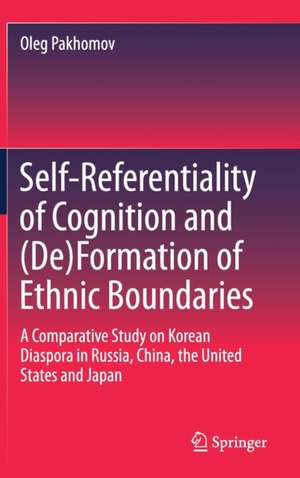Self-Referentiality of Cognition and (De)Formation of Ethnic Boundaries: A Comparative Study on Korean Diaspora in Russia, China, the United States and Japan
Autor Oleg Pakhomoven Limba Engleză Hardback – 28 iul 2017
This book challenges interactionist and post-modernist paradigms that dominate today’s social science and facilitates dialogue between social and natural scientists, especially cognitive studies to promote more complex and still systematic approach towards society. It combines in-depth research, comparative perspectives and theoretical thoroughness. It appeals to anyoneinterested in history, culture, economic and other aspects of Korean migration; the general theory and practice of migration; East Asian studies, Asian American studies, Russian studies and studies on social complexity and cognition.
| Toate formatele și edițiile | Preț | Express |
|---|---|---|
| Paperback (1) | 383.71 lei 6-8 săpt. | |
| Springer Nature Singapore – 12 dec 2018 | 383.71 lei 6-8 săpt. | |
| Hardback (1) | 391.02 lei 6-8 săpt. | |
| Springer Nature Singapore – 28 iul 2017 | 391.02 lei 6-8 săpt. |
Preț: 391.02 lei
Nou
Puncte Express: 587
Preț estimativ în valută:
74.82€ • 80.01$ • 62.38£
74.82€ • 80.01$ • 62.38£
Carte tipărită la comandă
Livrare economică 18 aprilie-02 mai
Preluare comenzi: 021 569.72.76
Specificații
ISBN-13: 9789811055041
ISBN-10: 9811055041
Pagini: 285
Ilustrații: XI, 206 p. 1 illus. in color.
Dimensiuni: 155 x 235 mm
Greutate: 0.49 kg
Ediția:1st ed. 2017
Editura: Springer Nature Singapore
Colecția Springer
Locul publicării:Singapore, Singapore
ISBN-10: 9811055041
Pagini: 285
Ilustrații: XI, 206 p. 1 illus. in color.
Dimensiuni: 155 x 235 mm
Greutate: 0.49 kg
Ediția:1st ed. 2017
Editura: Springer Nature Singapore
Colecția Springer
Locul publicării:Singapore, Singapore
Cuprins
Part I Formation of Korean Modernities.- Part II Korean Diaspora and (Post) Socialist Modernization in Russia and China.- 1.“National (Dis) Unity” of Korean Diaspora in Russia.- 2. “Social (Dis) Harmony” of Korean Diaspora in China.- Part III Korean Diaspora and Capitalist Modernization in the United States and Japan.- 3. Ethnic (Dis) Balance of Korean Diaspora in the United States.- 4. Moral (Dis) Content Korean Diaspora in Japan.- Part IV. Socialist and Capitalist Modernization of Nation of Origin and Formation of Diaspora Politics.- 5. North Korea and Political (Dis) Loyalty of Korean Diaspora.- 6. South Korea and Social (In) Equality of Korean Diaspora.- Conclusion.- Notes.- Bibliography.
Notă biografică
Dr. Oleg Pakhomov graduated from the International Relations Faculty, Far Eastern National University, in 2003. He received his PhD in Anthropology from the School of Integrated Human Studies, Kyoto University in 2011. He currently works at the Institute of Oriental Studies and International Relations, Kazan Federal University. His research interests focus on complex approach towards interrelation between cognition and ethnic/national culture on the example of North East Asia (China, Japan, North and South Korea, Russia)
Textul de pe ultima copertă
This book develops a new approach towards the formation of the ethnic boundary as a complex interrelation between cognitive operations and ethnic/national boundaries formation process. Korean diaspora in China, Russia, the United States, and Japan illustrate how this process correlates with the nationalism of the host societies, highlighting the differences and similarities. It covers a wide range of topics, from politics and economics to arts, mass culture and psychology, from comparative and interdisciplinary perspectives, at the same time avoiding eclectic combinations of different spheres of knowledge.
This book challenges interactionist and post-modernist paradigms that dominate today’s social science and facilitates dialogue between social and natural scientists, especially cognitive studies to promote more complex and still systematic approach towards society. It combines in-depth research, comparative perspectives and theoretical thoroughness. It appeals to anyoneinterested in history, culture, economic and other aspects of Korean migration; the general theory and practice of migration; East Asian studies, Asian American studies, Russian studies and studies on social complexity and cognition.
Caracteristici
Serves as a link between Korean studies and other disciplines Develops the notion of “complexity,” making it applicable to social science Facilitates dialogue between different spheres of knowledge on the basis of self-referential organization of social and natural phenomena Includes supplementary material: sn.pub/extras
